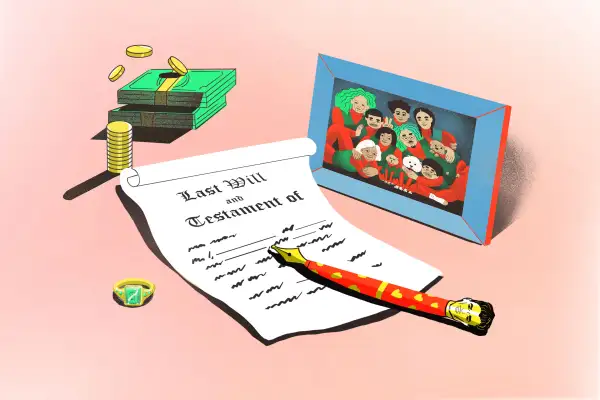Why You Might Want a Will, Even if You Don’t Have Valuable Assets

Welcome to Dollar Scholar, a personal finance newsletter written by a 28-year-old who’s still figuring it out: me.
Every week, I talk to experts about a money question I have, whether that’s “What if I don't have a 401(k)? or “How many credit cards do I need?” As I learn, I share simple ways to improve your financial life… and post cute dog photos.
This is (part of) the 38th issue. Check it out below, then subscribe to get future editions of Dollar Scholar every Wednesday.
I turned 28 last week, so it’s time to think about death.
I’m only half kidding. Though I don’t usually have a ton of hang-ups about my age, the sheer amount of anxiety I have around this coronavirus pandemic has gotten me considering the inevitable. Do I need to get my affairs in order? Do I even have any affairs?? Wait, should I have an affair???
Devoted Scholars will remember from the time I tried to calculate my net worth that my portfolio is… lacking. My assets include a signed copy of Turtles All the Way Down, two different tie-dye manatee T-shirts and a pair of wireless earbuds I accidentally put through the wash last week. I also have a lot of popcorn in my apartment right now, though I suspect that’s not as valuable to others as it is to me.
Given my pathetic cache of belongings, do I need a will? How would I even go about making one?
I took my cheery question to Allison Kade, millennial money expert at life insurance startup Fabric. She had an answer ready: “If you have anything you want to dictate where it’ll go when you’re gone, it’s probably worth having a will.”
The Cornell Law School’s Legal Information Institute states that when a person dies without a will, they’ve died “intestate.” As a result, the estate goes through probate court, where laws will dictate who gets what. Probate laws are different depending on the state.
Typically, Kade said, the court funnels a person’s belongings to whoever is closest to them in their bloodline. But that might not align with how I want my stuff split up.
“Say you’re best friends with your cousin, but you have an estranged brother,” Kade says. “The court doesn’t necessarily know that.”
That’s why it’s a good idea for me to write out what I DO want. Some states allow for this to be a relatively informal process by accepting what’s called a holographic will. Holographic wills are hand-written (or, in at least one case, carved into the fender of a tractor). Other states require more official wills, with multiple witnesses and signatures and everything.
In both cases, specificity is key because I won’t be around to explain my wishes.
“The issue that comes into play is if someone tries to challenge [the will],” Kade says. “If you wrote it on a napkin, and it was vague, it is what it is.”
She added that making a will is also just a nice thing to do for my family. I don’t want to stress them out by forcing them to make a bunch of decisions while they’re mourning the departure of the coolest tie-dye-wearing gal there ever was.
To that end, Kade recommended devoting a little bit of time to figuring out my final wishes. I need to choose who I want to get what, who should be the executor to carry out my will and — if I have kids — who should be their guardian.
“If you know those three answers, you can make a will on Fabric in five minutes,” she says.
Although Fabric seems like a cool product, it might not be the best option right now in quarantine because I'll likely need to print a paper copy of my will and get it signed by witnesses in order for it to be valid. (This is also the case with other online services like LegalZoom.) I don’t have a printer at home and I’m socially distancing, so I’m SOL.
Brian Bruggeman, financial planning manager at Baker Boyer in Walla Walla, Wash., told me I should skip online will services and consider getting an attorney to help me so I don’t screw this up. The more complicated my life, the more I probably need outside help.
Plus, he pointed out, there’s a lot more that goes into end-of-life planning than just a will.
Something I may be able to do while in isolation, for example, is update the beneficiaries on my life insurance and retirement accounts. This is especially important if I’ve undergone any big life changes, like getting married or having children, in the last couple of years. Given the nature of the coronavirus crisis, I should also check into establishing a health care proxy.
“Who do I want to make decisions for me if I become incapacitated? Who do I want my assets to go to?” Bruggeman says. “There’s a lot of documents that go into estate planning.”
Bottom line: I probably don’t need a will because I’m single and childless, but it’s not a bad idea to make one. That way, I can take some of the burden off my relatives and get a say in who gets which of my assets. The specifics vary by state, but I’ll probably need to print out the will and get it signed by witnesses, which could prove difficult during the coronavirus outbreak.
I can, however, do some of the prep work by thinking through what I want. Viking funeral, anybody?
More from Money:
Everything You Need to Know About Making a Will Online
I Asked 12 Life Insurance Companies About Coverage During the Coronavirus Crisis
